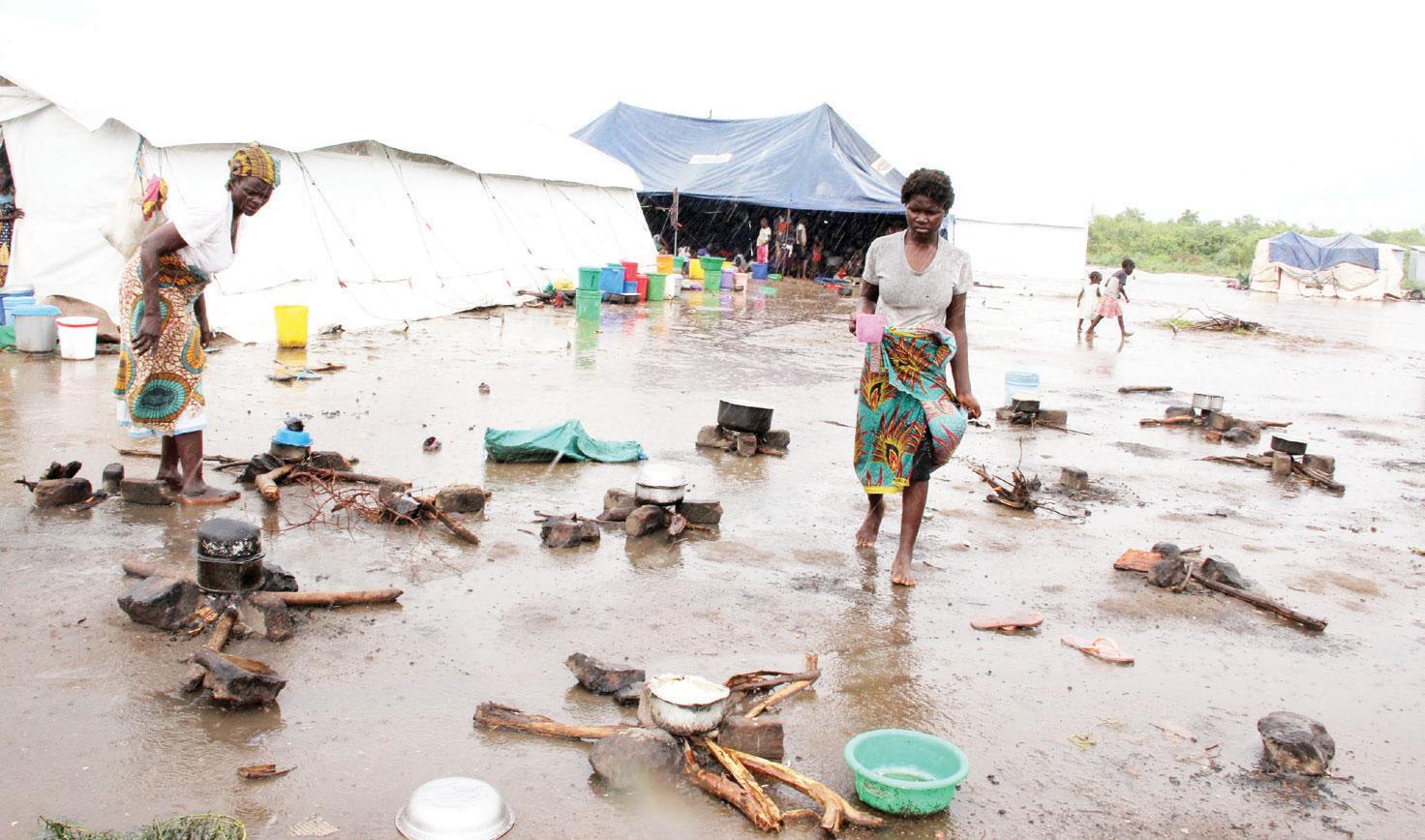Africa-Press – Malawi. Never, in 60-year-old Alick Simeon’s life, did he think that he would spend five months at a camp, let alone depending on handouts from well-wishers to see him and wife through every single day.
“But this is the situation I have found myself in, after floods washed away my house, household property such as mats, plates, pots, winnowers, pails, maize floor, 12 bags of maize, three bags of rice, one litre of cooking soil, salt, sugar, clothes, blankets….” Simeon, breaking in mid-sentence to pull back tears said.
He is one of the Shire Valley people whose lives have been torn asunder after natural disaster struck in January this year.
This year, and especially for Shire Valley people in the districts of Nsanje and Chikwawa, the word natural disaster sparks memories of Tropical Storm Ana.
The storm, which formed in the Indian Ocean on January 21 2022, made landfall in Malawi three days later, on January 24, bringing, in Department of Climate Change and Meteorological Services Director Lucy Mtilatila’s words, “heavy rain” that culminated in devastating floods.
In total, 20 districts in the Southern and Northern regions were affected by the storm, with the Department of Disaster Management Affairs (Dodma) listing Chikwawa, Phalombe, Chiradzulu and Mulanje among the most affected districts.
According to Simeon, who has been getting relief items at Kalima Camp in Chikwawa District, the past “five months have been among the most difficult in my life”.
Gogo Sato, who claims to be in her 70s but has no supporting documents, echoed the sentiments.
She said flood survivors have been living a hand-to-mouth life.
“To make matters worse, no one has offered to construct durable houses for us. We cannot go back home because our houses were reduced to rubble and we cannot start rebuilding because we do not have the financial resources, let alone building materials.
“To make matters worse now, the past seven days have been extremely cold and, yet, we do not have enough blankets to keep us warm, especially at night. With this weather, one needs two or three blankets to protect oneself from pneumonia, colds and the like,” she said.
Sato said, if she had her way, she would buy a piece of land upland, “where floods cannot disturb my life, and live in peace. Life at a floods survivors’ camp is unbearable”.
Group Village Headman Kalima (GVH) 2 of Chikwawa cannot agree more.
“My people have had enough of problems. My people have been through a lot since the storms affected our district of Chikwawa. People need food. People need clothes. People need blankets; they need cooking utensils and cooking oil and maize flour.
“But the problem is that such things are not easy to find. To make matters worse, some well-wishers think that the floods are over and that people no longer need help. This is not the case. There are people who are still in camps, people who lack the basic necessities such as cooking oil, maize flour, soya pieces and sugar,” he said.
He said, most importantly, flood survivors do not want to go through the experience they went through this year; as such, he says, they have been lobbying the authorities to identify pieces of land on which they can start a new home.
“Enough is enough. Some of the areas people stay in are flood-prone and the most logical thing to do would be to help the people relocate.
“The good thing is that people want to relocate upland so that they can be safe from natural disasters such as floods. To this effect, we have been writing letters to the district council and some non-governmental organisations to assist us with land,” he said.
The idea has been embraced by a horde of other traditional leaders, including GVH Kalima 1.
“We cannot continue in stand in floods’ way. There cannot be sustainable development where natural disasters destroy infrastructure people erect and other facilities. In fact, no serious investor or land developer would put their money in an area that is flood-prone because they know that, no matter how long it takes, floods will still come and destroy things,” he said.
The GVH said, for this reason, they have been discussing the possibility of relocating so that, like the rest of the population, they can lead their lives normally, without being at the mercy of unpredictable devices such as floods.
“We want to be safe from floods and other natural disasters; that is all we crave, he said.
When Malawi Red Cross Society officials visited the camp this week, campers made their views known.
They said all they wanted was somewhere safe, and not relief items that run out sooner rather than later, putting them in the unenviable position of perpetual beggars.
According to Chikwawa District Senior Assistant Social Welfare Officer, Isaiah Funsani, council officials have been thinking about sustainable solutions to the problem of natural disasters.
He said, on the issue of relocation for people perpetually affected by floods, council officials were on top of things because they, too, wanted people to contribute to socio-economic development efforts without looking over their shoulders.
Patrick Duncan Phiri, who is Head of Planning, Quality and Learning at the Malawi Red Cross Society, said they were aware of the issue.
“We are aware that some of the dwellers at this camp have complained that they cannot go back home and discussions are underway to see how they can be assisted,” Phiri said.
The problem is that, apart from flood survivors, the country has many other people who are looking up to non- State actors as well as Dodma for assistance.
By May this year, Dodma has concluded its Lean Period Food Insecurity Plan reaching out 1.63 million Malawians who were assessed to be food insecure between December 2021 and February 2022.
Dodma Commissioner Charles Kalemba said the department used approximately K22.5 billion, combined assistance of cash and kind.
“Cash assistance amounted to K16 billion while the government pumped in 29,000 metric tonnes of maize, which is an equivalent of about K6.5 billion.
“We have managed to reach out to all the people who were food insecure in districts and towns in the whole country. We have reached out to the people with two versions of assistance; one group which is the bigger group we supported with what we call in-kind, thus food assistance in terms of maize. And we reached out to other groups using cash transfers in about eight districts. All in all the lean season response went on very well,” he said.
Initially, the then Ministry of Economic Planning and Development; and Public Sector Reforms through the Malawi Vulnerability Assessment Committee (Mvac) indicated that the vulnerable population would need 35 296 metric tonnes of maize, which was equivalent to K7.9 billion.
Later, policymakers arrived at K27 billion as the figure that would help them reach out to those in need. The target was not met, meaning that, apart from people that are camping in Chikwawa, even State agencies have been struggling to have their wishes granted.
For More News And Analysis About Malawi Follow Africa-Press






